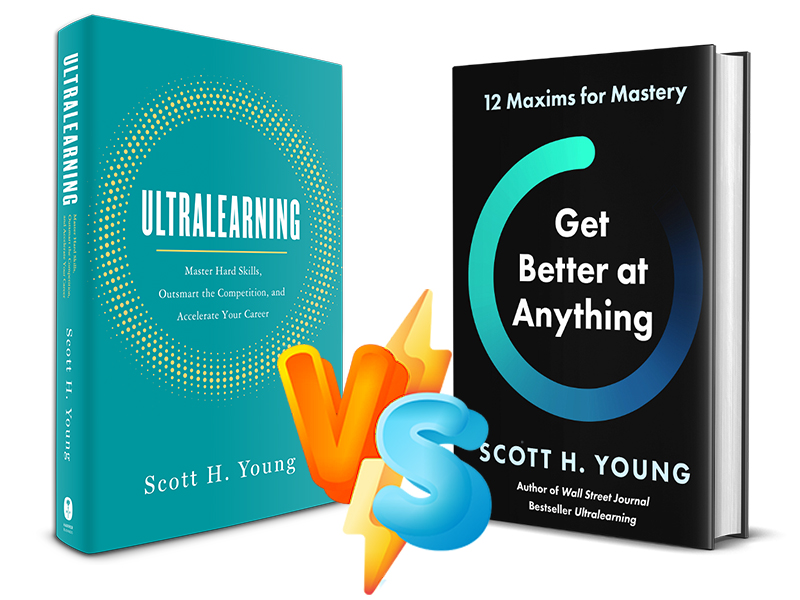When I decided to write another book about learning, I knew an obvious question would come up: How is this book different from your last one?

The truth is, I could write a dozen books on learning. Even when working on this one, I realized how many areas I couldn’t explore sufficiently: mental models, connectionism, background knowledge, declarative versus procedural learning, motor learning, nootropics, intelligence, explore-exploit tradeoffs, aging and more. Each topic could be its own book!
I took care not to repeat too much from my previous book when writing this one. Some repetition is unavoidable, as I didn’t want to make reading Ultralearning a prerequisite for Get Better at Anything, but I wanted the main concepts, stories and practical takeaways to be fresh.
At a high level, both books make a similar pitch: to help you get better at difficult skills and subjects, but they differ in significant ways. Today I thought it would make sense to explain how the books differ and what you can expect from each.
What’s the Difference?
The biggest difference between the books is the focus. Ultralearning is centered around intense, self-directed learning projects. While many of the principles of this book apply beyond that particular context, these impressive projects form the core of the book, and everything is organized around them.
Get Better at Anything, in contrast, centers on the concept that the combination of learning from other people, practicing for yourself and getting feedback are vital for improvement across many different disciplines, domains and pedagogical techniques.
The central figures of Ultralearning are impressive individuals—polyglots who speak dozens of languages; solo game developers who do the art, music and coding all on their own; chess prodigies and Scrabble savants.
For Get Better at Anything, I wanted the approach to learning itself to be central. So when I discuss the training of poker players, jazz musicians, science-fiction authors or Air Force pilots, it’s not to point out a particularly gifted individual, but to demonstrate the basic ingredients of learning through concrete examples.
Ultralearning was also a much more personal book, as debut books tend to be. I wanted to consolidate much of what I learned about effective learning strategies from the big public challenges that helped establish me as a writer into a single book.
In contrast, with Get Better at Anything, I challenged myself to write a more objective, research-driven book. While it’s impossible to avoid one’s own opinion, even when talking about science, I wanted to write a book that grappled with a wider range of expert opinions.
Has Your Advice Changed Between Books?
My core beliefs about learning haven’t changed much between the two books. The minor updates to my views since writing Ultralearning are reflected in Get Better at Anything, namely:
- The importance of clear examples vs. pure practice. Because of its focus on self-directed learning, I emphasized problem-solving and practice in Ultralearning. While I still believe that practice is important, I’ve come to think that the effort required for learning by problem-solving can be excessive, particularly if good examples are available.1
- The value of foundational learning before direct practice. Directness, the idea that you should practice the exact skill you want to get good at, was a core principle of Ultralearning. I still think this approach is valuable, but it’s now clearer to me that many complex domains are easier to learn after a preparatory phase spent learning their core components and background knowledge.
- The value of early access to teachers and coaches. Again, partly because of the emphasis on self-directed learning in Ultralearning, I didn’t emphasize the value of good coaches and teachers. I’m now convinced that access to good instruction and corrective feedback is essential for efficient learning.
Overall, the changes are more a matter of emphasis rather than a reversal of opinion. My advice on learning evolves, in large part, because I’m continuously trying to improve my own understanding of it. While it might seem more convenient to come up with an idea and spend the rest of my writing career defending it, I’d prefer my writing about learning to reflect my philosophy of it—which will shift as I continuously work to refine my thinking.
Which Book Should You Read?
Both!
All kidding aside, the two books are complementary—reading one isn’t a substitute for reading the other.
But if you only have time for one book about learning, I’d recommend Get Better at Anything. It offers a broad range of practical advice for learning and improvement, while drawing on a deeper base of ideas about learning grounded in cognitive science.
Of course, time will tell whether readers agree with that assessment! Perhaps if this book comes close to the success I’ve had with Ultralearning, I’ll be able to write a third book about learning, covering a few more of the dozens of important ideas I wasn’t able to fit into my first two.


 I'm a Wall Street Journal bestselling author, podcast host, computer programmer and an avid reader. Since 2006, I've published weekly essays on this website to help people like you learn and think better. My work has been featured in The New York Times, BBC, TEDx, Pocket, Business Insider and more. I don't promise I have all the answers, just a place to start.
I'm a Wall Street Journal bestselling author, podcast host, computer programmer and an avid reader. Since 2006, I've published weekly essays on this website to help people like you learn and think better. My work has been featured in The New York Times, BBC, TEDx, Pocket, Business Insider and more. I don't promise I have all the answers, just a place to start.